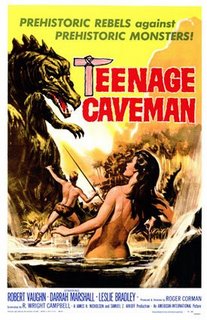 “i miss you
“i miss you
but i haven't met you yet
so special
but it hasn't happened yet
you are gorgeous
but i haven't met you yet
i remember
but it hasn't happened yet”
-Bjork, “I Miss You”
Ladies and gentlemen, the Freaking Coolest Health Discovery of Our Lifetime has finally hit the newswires. That’s right, while you were laughing at Heather and Jessica’s witty lambaste of Beyonce’s bizarre Oprah show gown, people whose brains threaten to unbalance the polar axis were busy figuring out why you’re such a procrastinator.
Ah, there's nothing like a fresh new reason to abdicate personal responsibility. Epigenetics, people. Mark my words: it will change human life as we know it. Here's some reading material for you:
Laypeople
People comfortable with science and scientific terminologyAdult virgins who have developed their own coding languageEpigenetics really, really simplified
Your gassy digestive system? Blame it on your great-great-great grandfather-to-the-power-of-45 and his love of savana wheatsprouts. Your fear of kittens? Might be down to that time your great-great grandmother-to-the-power-of-38 moved the whole damn family to sabre-tooth tiger country. (What was she thinking?)
We all know that most of our physical traits are hardwired into us through our genes. Since the discovery of DNA, scientists have been looking at ‘inheritance’—how we inherit genetic traits from our parents—and how genes affect non-physical things like behaviour. It’s the old Psych 101 ‘nature versus nurture’ discussion.
Well, the braniacs have recently begun to understand that in fact nature and nurture are not mutually exclusive. There’s a meta-system, a chemical soup if you will, that switches genes off and on—not in the womb, but over the course of our lives. This is epigenetics. Epi: prefix, Greek, means "upon."
So?
This epigenetic system influences the very core of who you are, genetically. It decides to switch the genes you are made of on and off. If it switches off, say, your genetic predisposition to cancer…well, you’re laughing, aren’t you?
One of the coolest things about epigenetics is that it suggests that our day-to-day experience and living environment affect who we are at a genetic level, on an ongoing basis--not just when our parents were 'swapping chromosomes' thirty-some years ago (nudge nudge wink wink). Not only does it affect who we are genetically over time, but we then pass this genetic information on to our kids, grandkids, great-grandkids, etc, so they are literally genetic reflections of our lives and experiences.
Okay, maybe I'm taking this too far now, but consider this: Does a certain scent trigger an inexplicable sadness or joy in you? Maybe it’s the scent of the old country—a place you’ve never been and yet which your body remembers. Do particular sounds or images seem oddly familiar though you’ve never encountered them before? It’s not inconceivable that you are having a genetic memory of something that happened to somebody else. If true, that is freaking cool.
Healing, responsibility, blah, blah, blah
Epigenetics has the potential to completely change the way we treat disease. One Canadian researcher at the forefront of this branch of science started with the objective of understanding the genetic causes of cancer. God love CBC, they had a great radio spot on him this morning (The Currrent, with Anna Maria Tremonti). He talked about experiments he’s doing in the lab where he is successfully reversing cancer in rats. Reversing cancer.
If we understand the epigenetic system—the metadata and chemicals that switch genetic bits and bytes on or off—we have the potential to control our genome through drugs. (!) Behaviour modification for rapists, healing for the diseased: this could change everything. Of course, knowing humans, we’ll also be dealing with mail-order perfecto-babies and cloned soldier-slave drones, but silver linings, people, silver linings.
Ah but with deeper knowledge comes great responsibility, Danielsan. When we didn’t realize we had such a profound genetic impact on our great-great grandchildren, our guilt extended only to the trash-heap of a planet we’re leaving them. Now we know we’re also passing along our personal turmoil, suffering, and bad habits. "This work is at the forefront of a paradigm shift in scientific thinking. It will change the way the causes of disease are viewed, as well as the importance of lifestyles and family relationships. What people do no longer just affects themselves, but can determine the health of their children and grandchildren in decades to come. "We are," as Marcus Pembrey says, "all guardians of our genome.""
Oh. My. God. I don't think I can handle that kind of pressure. And I don't even have kids yet.
But it also means that we make them better, healthier humans through our joys and our successes and our surprising capacity to be good to each other.
 Wah wah, I know. We've all been here. Stupid work getting in the way of blog writing.
Wah wah, I know. We've all been here. Stupid work getting in the way of blog writing.